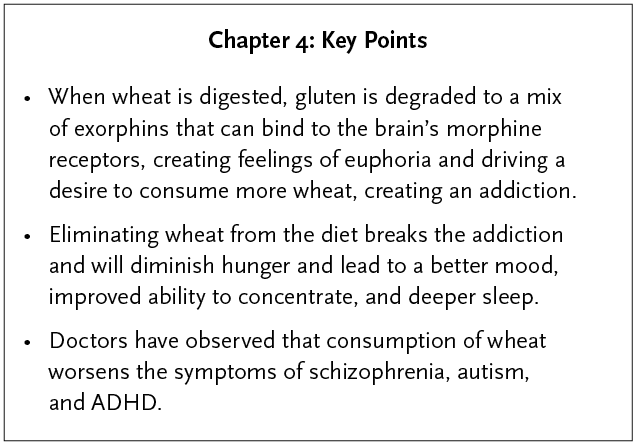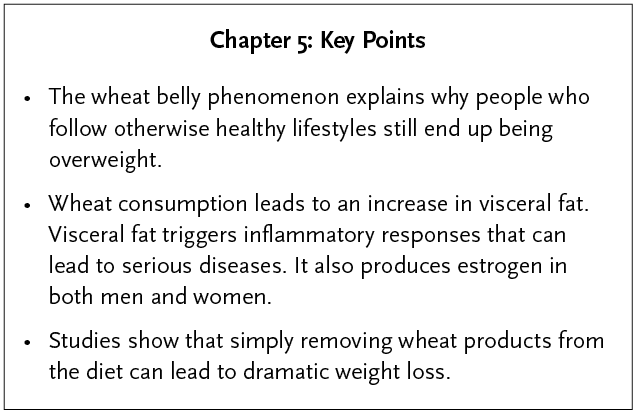Summary: Wheat Belly ...in 30 Minutes (3 page)
Read Summary: Wheat Belly ...in 30 Minutes Online
Authors: 30 Minute Health Summaries


HEY, MAN, WANNA BUY SOME EXORPHINS? THE ADDICTIVE PROPERTIES OF WHEAT
Overview
According to Davis, wheat is one of the few foods that can change our behavior and alter our moods. Studies show that when people completely eliminate wheat from their diets, they initially experience feelings of withdrawal; only eating wheat can alleviate these feelings. Additional studies observe that people suffering from schizophrenia, autism, and ADHD experience more severe symptoms of the diseases when wheat is present in their diets. These findings suggest that adopting a wheat-free diet will potentially improve mood and overall health.

“[W]heat is one of the few foods that can alter behavior, induce pleasurable effects, and generate a withdrawal syndrome upon its removal.”
â Dr. William Davis,
Wheat Belly

Chapter Summary
According to Davis, wheat induces feelings of pleasure for some people. When interpreted as cravings, these feelings can eventually lead to a wheat addiction. As wheat is digested, the glutens degrade to a mix of special polypeptides (chains of amino acids that form part of a protein molecule) that are able to penetrate the blood-brain barrier that separates the brain from the bloodstream. Once these special polypeptides, called exorphins, enter the brain, they bind to the brain's morphine receptors. Scientists believe these exorphins are responsible for a wheat-induced feeling of euphoria and the associated addictive response. In experiments, when the exorphins are blocked, people eat less wheat and lose weight.
Dr. F. Curtis Dohan at the Veterans Administration Hospital in Philadelphia observed that exorphins also affect the moods and behaviors of patients suffering from schizophrenia. After four weeks on a wheat-free diet, doctors reported the patients experienced reduced auditory hallucinations, fewer delusions, and less detachment from reality. When they placed these same patients back on a diet that included wheat, the symptoms resumed normal levels. Studies suggest that autistic children and those suffering from ADHD may also show improved behavior on a gluten-free diet, although these findings are less conclusive. While Davis says it is unlikely wheat
caused
these problems, it appears to be associated with worsening of the symptoms.
Davis claims that wheat is one of very few foods shown to alter moods and create addictive behaviors. Taking it one step further, he suggests that because wheat can cause pleasure, pushing us to want more, it is an appetite stimulant. Continuing this argument, Davis says a wheat-free diet will diminish hunger and cravings, and lead to fewer mood swings, improved ability to concentrate, and deeper sleep.

“Understanding that wheat, specifically exorphins from gluten, have the potential to generate euphoria, addictive behavior, and appetite stimulation means that we have a potential means of weight control: Lose the wheat, lose the weight.”
â Dr. William Davis,
Wheat Belly



YOUR WHEAT BELLY IS SHOWING: THE WHEAT/OBESITY CONNECTION
Overview
According to Davis, the dramatic rise of obesity and diabetes in the United States came at the same time that nutritional experts began advising us to eat more whole grains. In an effort to be healthy, Americans began eating wheat in unprecedented amounts, driving blood sugar levels higher. These spikes in blood sugar led to an accompanying growth of visceral fat, a dangerous type of fat that surrounds the organs and has been linked to diabetes, dementia, heart disease, and colon cancer. Davis suggests that removing wheat from the diet promotes weight loss because it eliminates spikes in blood sugar and its accompanying visceral fat gain.

“I'd like to make the case that foods made with or containing wheat make you fat. I'd go as far as saying that overly enthusiastic wheat consumption is the
main
cause of the obesity and diabetes crisis in the United States.”
â Dr. William Davis,
Wheat Belly

Chapter Summary
Recommendations to consume more whole grains are primarily based on two findings. The first is real evidence that when processed grain flour products are replaced with whole grain flour products, there is a reduction of colon cancer, heart disease, and diabetes. The second is observations that suggest higher dietary fat intake is associated with higher cholesterol levels and risk for heart disease. But increasing wheat consumption, even whole grains, has never been proven to be a healthy diet.
Wheat triggers a cycle of insulin-driven satiety and hunger that lead to the deposition of visceral fat. This fat accumulates around the liver, kidneys, pancreas, abdomen, and intestines. Visceral fat is unique in its ability to trigger the body's inflammatory responses. The specific response triggered by visceral fat underlies diabetes, hypertension, heart disease, dementia, arthritis, and colon cancer.
Visceral fat also produces estrogen in both men and women. Increased visceral fat has been associated with an increased risk for breast cancer in women. It stimulates the growth of breast tissue in men, leading to “man boobs.”
People with celiac disease have an inflammatory response to gluten that destroys the lining of their intestines. Remove all gluten, and the lining regenerates and health is restored. Experts on the disease have observed that increasingly, newly diagnosed patients are overweight or obese. Studies show that simply removing all gluten products from their diet, with no other intervention, causes dramatic weight loss.
While commercial gluten-free foods do not trigger the inflammatory responses that characterize celiac disease, they usually replace gluten with starches. These starches still trigger the glucose-insulin responses that cause weight gain. So a healthy diet completely eliminates all sources of amylopectin A, and that includes starches.

“Wheat elimination is a vastly underappreciated strategy for rapid and profound weight loss, particularly from visceral fat.”
â Dr. William Davis,
Wheat Belly


